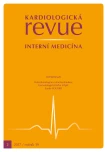-
Medical journals
- Career
Endocrine hypertension
Authors: O. Stránský; M. Souček
Authors‘ workplace: II. interní klinika LF MU a FN U sv. Anny v Brně
Published in: Kardiol Rev Int Med 2017, 19(2): 111-114
Overview
The most common endocrine causes of hypertension are syndromes caused by overproduction of mineralocorticoids – primary hyperaldosteronism (Conn's syndrome), and hypertension in tumours of the chromaffin tissues of the sympathetic nervous system (pheochromocytoma and paraganglioma). Endocrine hypertension is rare in congenital adrenal hyperplasia with specific steroidal enzyme disorders combined with hypertension (blockade of the 17-alpha hydroxylasis enzyme and 11-beta hydroxylasis enzyme). Hypertension, usually of a mild degree, may quite often occur as a minor symptom in a number of endocrine gland disorders – for example, endogenous hypercorticism (ACTH-dependent Cushing's disease and ACTH-independent Cushing's syndrome), hyperthyroidism, hypothyroidism, primary hyperparathyroidism, acromegaly, renin-secreting tumours (Wilms tumour diagnosed usually in childhood). The diagnosis of endocrine hypertension is based on a complete history of the patient and objective physical examination. Endocrine hypertension is diagnosed by excluding other secondary causes of hypertension, especially of renovascular and renoparenchymatous etiology. The examination consists of specific laboratory tests under specific conditions for blood and urine sampling. When the laboratory results are positive, we confirm the diagnosis by imaging examinations. The treatment of endocrine hypertension depends on its etiology; unilateral adrenalectomy is recommended in adrenal hyperfunctional adenoma with mineralocorticoid overproduction and pheochromocytoma, pharmacological therapy with aldosterone antagonists is preferred in patients with idiopathic hyperaldosteronism, in congenital adrenal hyperplasia we use chronic suppressive glucocorticoid therapy. The approach to other endocrine diseases, where hypertension is not the dominant symptom, is based on the treatment of the endocrinopathy itself – a transsphenoidal extirpation of the pituitary adenoma is used for Cushing's disease and acromegaly, unilateral adrenalectomy is indicated for ACTH-independent hypercortisolism, pharmacological treatment is used to treat hyperthyroidism or hypothyroidism and parathyroidectomy in primary hyperparathyroidism. The primary task for a successful treatment of hypertension is to think about the potential endocrine origin.
Keywords:
primary hyperaldosteronism – pheochromocytoma – Cushing's syndrome – primary hyperparathyroidism
Sources
1. Widimský J. Hypertenze. Praha: Triton 2002.
2. Gordon RD. Primary aldosteronizm. J Endocrinol Invest 1995; 18(7): 495 – 511.
3. Partsch CJ, Mönig H, Sippel WG. Endokrinologická funkční diagnostika. Praha: Galen 2008.
4. Marek J a kol. (ed). Endokrinní hypertenze. Praha: Galén 2004.
5. Kudva I, Sawka A, Young WF Jr. Clinical review 164: The laboratory diagnosis of adrenal pheochromocytoma: The Mayo Clinic experience. J Clin Endocrinol Metab 2003; 88(10): 4533 – 4539.
6. Ilias I, Pacák K. Current approaches and recommended algorithm for the diagnostic localization of pheochromocytoma. J Clin Endocrinol Metab 2004; 89(2): 479 – 491.
7. Zelinka T, Widimský J et al. Léčba sekundární hypertenze u feochromocytomu. Cor Vasa 1998; (Suppl): 59.
8. Kaplan NM. Pheochromocytoma. In: Kaplan NM (ed). Clinical hypertension. 7th ed. Baltimore: Williams and Wilkins 1998.
9. Kreze A, Lager P, Klimeš I et al. Všeobecná a klinická endokrinológia. Bratislava: AEP 2004 : 337 – 350.
10. Kršek M, Hána V a kol. Cushingův syndrom. Praha: Galen 2006.
11. Greenspan FS, Baxter JD. Základní a klinická endokrinologie. Primární hyperparathyreosa. 1. vyd. Praha: H&H 2003 : 271 – 288.
12. Broulík P. Poruchy kalciofosfátového metabolizmu. Praha: Grada Pubishing 2003.
13. Šulcová J, Stárka L. Adrenální enzymopatie s pozdním nástupem. In: Stárka L a kol. (eds). Aktuální endokrinologie. Praha: Maxdorf 1999 : 540 – 562.
Labels
Paediatric cardiology Internal medicine Cardiac surgery Cardiology
Article was published inCardiology Review

2017 Issue 2-
All articles in this issue
- Treatment of hypertension in the old and very old
- Control of blood pressure in primary and secondary prevention of stroke
- Endocrine hypertension
- The relation between blood pressure and pain – what do we know already?
- Selected comments on the FOURIER study
- Implementation of Guidelines for Diagnosis and Treatment of Heart Failure 2016 in clinical practice – the role of ivabradine
- Pharmacotherapy of heart failure with preserved ejection fraction
- Electrocardiogram and cardiac stimulation
- Target blood pressure values in heart failure
- New fixed antihypertensive combinations
- Hypertension and heart failure
- Hypertension and ischaemic heart disease – dangerous siblings
- Cardiology Review
- Journal archive
- Current issue
- Online only
- About the journal
Most read in this issue- Target blood pressure values in heart failure
- New fixed antihypertensive combinations
- Electrocardiogram and cardiac stimulation
- Pharmacotherapy of heart failure with preserved ejection fraction
Login#ADS_BOTTOM_SCRIPTS#Forgotten passwordEnter the email address that you registered with. We will send you instructions on how to set a new password.
- Career

